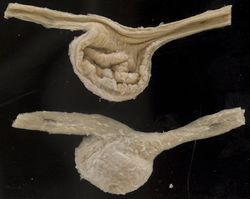Difference between revisions of "Crop - Anatomy and Physiology"
Fiorecastro (talk | contribs) |
|||
| (9 intermediate revisions by 4 users not shown) | |||
| Line 1: | Line 1: | ||
| + | |||
| + | Also known as: '''''Ingluvies''''' | ||
| + | |||
==Introduction== | ==Introduction== | ||
The crop is a food storage device present in avian species. It is usually used when the muscular stomach ([[Gizzard - Anatomy & Physiology|gizzard]]) is full. The crop also softens food. | The crop is a food storage device present in avian species. It is usually used when the muscular stomach ([[Gizzard - Anatomy & Physiology|gizzard]]) is full. The crop also softens food. | ||
| − | It is a useful tool for avian veterinarians and owners for assessing | + | It is a useful tool for avian veterinarians and owners for assessing if a bird has recently eaten and it is especially important to ensure young chicks always have full crops. It is also a common site for impactions, rupture and surgical entry to remove foreign bodies. |
==Structure and Function== | ==Structure and Function== | ||
| − | [[Image:Crop of fowl.JPG|thumb|right| | + | [[Image:Crop of fowl.JPG|thumb|right|250px|Crop of fowl(Copyright RVC)]] |
| − | |||
| − | |||
| − | |||
| − | |||
| − | |||
| − | |||
| − | + | The crop is a muscular chamber. It is a fusiform enlargement of the ventral wall of the [[Oesophagus - Anatomy & Physiology|oesophagus]] at the thoracic inlet. It bulges and lies against the breast muscles. | |
==Innervation== | ==Innervation== | ||
| − | + | The crop is innervated by the '''vagus nerve''' ([[Cranial Nerves - Anatomy & Physiology|CN X]]). | |
==Species Differences== | ==Species Differences== | ||
| − | + | The crop is absent or vestigial in '''waterfowl''' (ducks, swans and geese) and '''owls''' and tends to be much larger and muscular in '''seed eating birds''' and '''carnivorous birds of prey'''. '''Pigeons''' have epithelial cells in their crop sensitive to prolactin which slough when chicks (squabs) hatch, producing crop milk. | |
| − | + | ==Links== | |
| − | + | '''Click here for more information on the [[Oesophagus - Anatomy & Physiology]]''' | |
| − | |||
| − | |||
| − | |||
| − | |||
| − | |||
| − | |||
| − | |||
| − | [[ | + | {{Template:Learning |
| + | |flashcards = [[The Avian Alimentary Tract - Anatomy & Physiology - Flashcards|Avian Alimentary Tract]] | ||
| + | }} | ||
| + | ==Webinars== | ||
| + | <rss max="10" highlight="none">https://www.thewebinarvet.com/gastroenterology-and-nutrition/webinars/feed</rss> | ||
[[Category:Avian Alimentary System - Anatomy & Physiology]] | [[Category:Avian Alimentary System - Anatomy & Physiology]] | ||
| − | [[Category: | + | [[Category:A&P Done]] |
Latest revision as of 15:01, 5 January 2023
Also known as: Ingluvies
Introduction
The crop is a food storage device present in avian species. It is usually used when the muscular stomach (gizzard) is full. The crop also softens food.
It is a useful tool for avian veterinarians and owners for assessing if a bird has recently eaten and it is especially important to ensure young chicks always have full crops. It is also a common site for impactions, rupture and surgical entry to remove foreign bodies.
Structure and Function
The crop is a muscular chamber. It is a fusiform enlargement of the ventral wall of the oesophagus at the thoracic inlet. It bulges and lies against the breast muscles.
Innervation
The crop is innervated by the vagus nerve (CN X).
Species Differences
The crop is absent or vestigial in waterfowl (ducks, swans and geese) and owls and tends to be much larger and muscular in seed eating birds and carnivorous birds of prey. Pigeons have epithelial cells in their crop sensitive to prolactin which slough when chicks (squabs) hatch, producing crop milk.
Links
Click here for more information on the Oesophagus - Anatomy & Physiology
| Crop - Anatomy and Physiology Learning Resources | |
|---|---|
 Test your knowledge using flashcard type questions |
Avian Alimentary Tract |
Webinars
Failed to load RSS feed from https://www.thewebinarvet.com/gastroenterology-and-nutrition/webinars/feed: Error parsing XML for RSS
